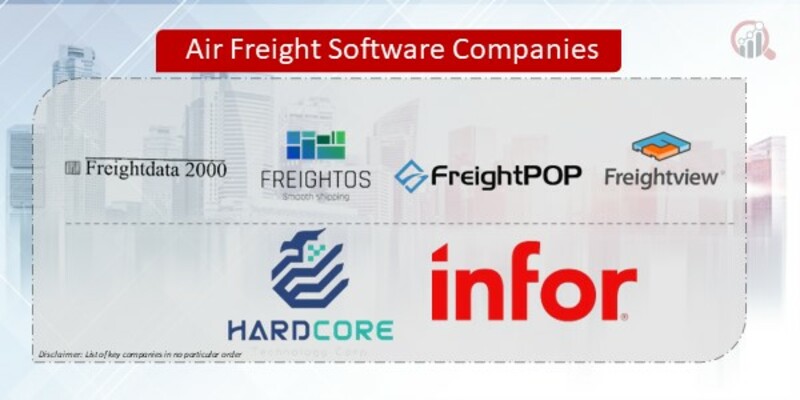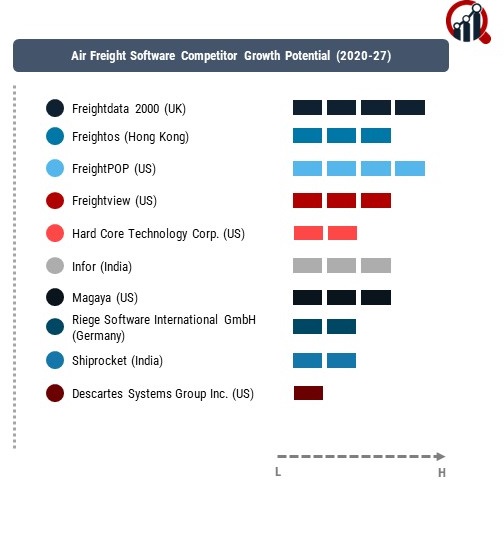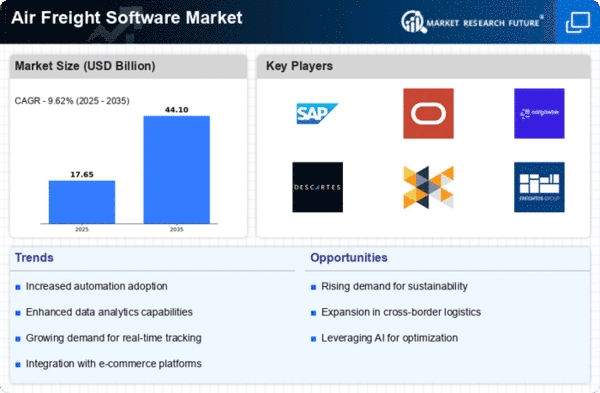Top Industry Leaders in the Air Freight Software Market

Strategies Adopted:
Innovation in Technology: Key players invest in developing advanced air freight software with features such as real-time tracking, predictive analytics, and automation to enhance operational efficiency and customer satisfaction.
Integration and Collaboration: Companies focus on integrating their air freight software with other logistics systems, such as transportation management systems (TMS) and warehouse management systems (WMS), to provide seamless end-to-end logistics solutions.
Customization and Scalability: Offering customizable and scalable air freight software solutions allows companies to meet the diverse needs of customers and adapt to changing market requirements, enhancing competitiveness and customer retention.
Regulatory Compliance: Ensuring compliance with air cargo regulations and industry standards, such as IATA's e-AWB initiative and customs documentation requirements, is crucial for gaining market acceptance and maintaining customer trust.
Prominent air freight software market players include
CHAMP Cargosystems S.A.
Freightos Limited
Infor (US), Inc.
Freightdata 2000 Ltd.
Riege Software International GmbH
The Descartes Systems Group Inc.
Magaya Corporation
Factors for Market Share Analysis:
Product Features and Capabilities: Market share analysis considers the breadth and depth of features offered by air freight software solutions, including booking, tracking, documentation, compliance, and analytics, as well as their usability, reliability, and performance.
Customer Base and Relationships: The size and loyalty of customer bases, as well as the strength of relationships with airlines, freight forwarders, logistics providers, and other industry stakeholders, influence market share by driving customer acquisition and retention.
Industry Reputation and Brand Recognition: Companies with strong reputations for reliability, innovation, and customer service are more likely to gain market share and outperform competitors in the highly competitive air freight software market.
New and Emerging Companies:
WebCargo by Freightos: WebCargo offers a digital air cargo platform that connects airlines, forwarders, and shippers, providing real-time pricing, capacity, and booking capabilities for air freight shipments.
Shipwell: Shipwell provides a cloud-based transportation management platform that includes air freight management features for shippers and freight brokers, offering visibility, automation, and collaboration tools.
Logitude by CargoX: Logitude offers a web-based freight forwarding solution that includes air freight management capabilities for small and medium-sized freight forwarders, focusing on simplicity, affordability, and ease of use.
Industry News and Current Trends:
Digital Transformation: The air freight software market is undergoing digital transformation, with companies increasingly adopting cloud-based, data-driven solutions to streamline operations, optimize resources, and improve customer experiences.
Adoption of AI and Automation: AI-driven automation is becoming increasingly prevalent in air freight software, enabling tasks such as predictive analytics, demand forecasting, route optimization, ad document processing to be performed more efficiently and accurately.
Focus on Sustainability: Sustainability is emerging as a key trend in the air freight industry, with companies developing eco-friendly solutions and implementing measures to reduce carbon emissions and environmental impact throughout the supply chain.
Overall Competitive Scenario:
The air freight software market is highly competitive, with key players vying for market share through innovation, integration, and customer-centric strategies. New entrants and emerging companies disrupt the market with agile, technology-driven solutions that address evolving customer needs and market trends. Collaboration, innovation, and customer satisfaction are essential for companies to maintain competitiveness and drive growth in this dynamic and rapidly evolving market.










